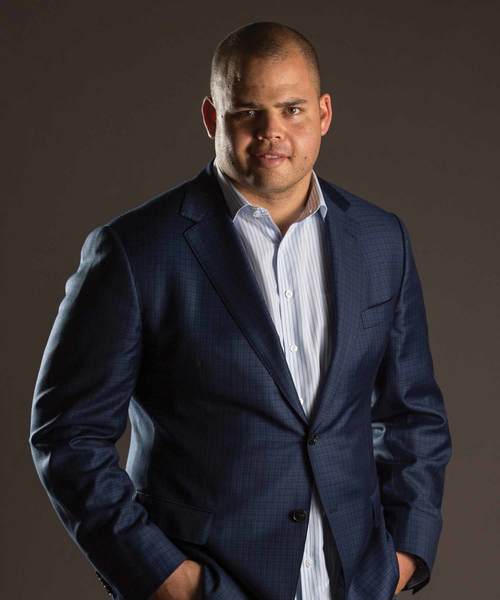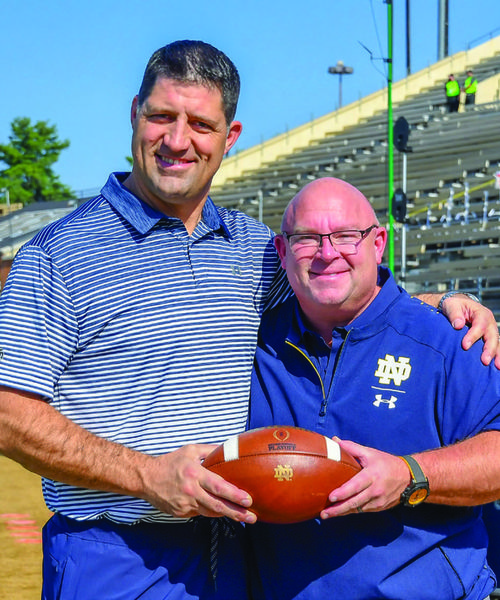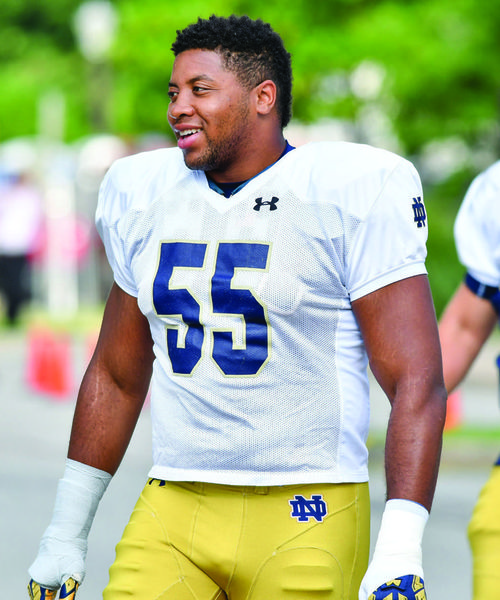
Jeff Faine
Big man, big heart
Jeff Faine has seen the troubling statistics.
In central Florida alone, 400 teenagers in foster care will turn 18 this year. Assistance from the state will end, and they’ll be left with nowhere to go and no one to help. Without help and guidance, many will face a lifetime of dependency—welfare, jail, homelessness.
The realities for former foster youth are harsh. Some 33 percent will be on the streets within three years, 66 percent are high school dropouts; 50 percent are unemployed, 50 percent will be incarcerated and 60 percent will have babies within four years.
The former University of Notre Dame football star and retired NFL veteran knows, there but for the grace of God, he could have been one of those at-risk young adults.
The 35-year-old Faine was born to a single teenage mother whose parents forced her to place him for adoption at birth. Seven days after he was born on April 6, 1981, he was on a Navy hospital plane from Milwaukie, Oregon, to Honolulu, wrapped in the arms of Lee and Finnis Faine, a loving and supportive couple who decided to adopt after watching a TV show called “Wednesday’s Child” that featured kids who needed a home.
The Faines picked up their new son from the local office of the Children’s Home Society and found a hotel room to stay the night before flying back to Hawaii, where Lee was stationed as a Naval officer for 21 years at Barbers Point and his wife was an elementary school teacher. Jeff slept in a baby carrier on the luckiest day of his life.
“Those two people are really my daily champions because almost everything that has come about is because of them, because of the opportunities they created for me and ultimately the way they raised me,” he says. “Growing up in a military household, there really wasn’t outside-the-box thinking—it was straight-forward focus.”
Jeff was one of the lucky ones. He escaped a system that is often characterized by neglect, and he has used that as motivation to give others a chance.
The result has been the Faine House, a small-scale group home for young adults who have aged out of state-run foster care without being adopted. The state legislature recently changed the age from 18 to 21, hoping to provide a bigger safety net.
The Faine House opened in 2013. It has room for 10 young adults, in partnership with the Children’s Home Society of Florida. Residents are assigned a room with its separate bathroom in a renovated home in the Pine Hills section of Orlando. But most importantly, the Faine House also helps the young adults complete their education and offers training in employment skills, personal finance, health and wellness in a stable atmosphere.
“It’s really the most rewarding thing I’ve done in my life,” Faine says.
Some 75 teenagers have gone though the program in three years. Most come through referrals from Children’s Society of Florida or sister-related programs. They submit an application and go through an interview process where, from the very beginning, they learn how to apply energy to be able to get opportunities.
“At the end of this world is a very small world and there are a lot of great case workers willing to share their stories,” Faine says. “'Here’s a great kid from Ft. Lauderdale who is coming of age and just needs an opportunity to take the next step and some stability. Not everybody makes it. At the end of the day, we only have two strong rules—respect for the house and people who work there and no drugs. They’re paying rent. They have to maintain employment. We get them job placement, internships to develop their business skills to make them more marketable at the starting level so they can secure some kind of full-time employment. Another requirement is that they have to be progressing in school to get their GED or high school degree and moving them on to the next level of education at community college, trade school.”
Cheryl Distler, the program director, also arranges for a psychiatrist to come in and help the kids work through emotional problems they’ve had in previous years. A banker comes in to help them budget and set up checking and saving accounts.
“The final requirement is they have to give back,” Faine continues. “We teach them from the very beginning about community services and they have to be mindful of others who may be in greater need than they are. I really can’t tell you how it makes me feel. If I’m having a bad week or need to get the juices flowing, I just go down to the house and see the kids.”
Eventually, Faine would like to expand the program to NFL cities throughout the country.
It is his way of giving back.
Faine spent the first 10 years of his life in Hawaii. When his father retired from the service, the family moved to Florida, where Jeff was urged to play football by his father as a freshman in high school.
“I almost quit my first team,” he says. “I just wasn’t used to the rigors of football. My father convinced me to give it another week.
“The first sport I played was soccer. I couldn’t play football in Hawaii because the Little League had a weight limit. My favorite sport was basketball. But at the end of the day, I started growing horizontally and not vertically.”
He blossomed into a USA Today first-team All America center at Seminole High School in Sanford, Florida. Faine was heavily recruited by Miami, Kentucky and Nebraska. He seriously considered Florida but then changed his mind and signed with Notre Dame because he felt it was the best place for him to get an education.
“Florida would have been the easy choice because it was only two hours away and I liked the coaches. But there was something different about Notre Dame. The weekend I made my official visit in South Bend, the conditions were everything against Notre Dame for a Florida boy,” Faine says.
“It was cold. It was snowing. But what was different was when I went to every other school, it was a tour pageantry of the stadium, the locker rooms, the football facilities. But at Notre Dame, when they picked me up, they took me right to the dean’s office. It set the tone of what the Notre Dame experience was all about. It is a totally well-rounded experience—not only the Notre Dame football experience, but at the end of the day, it was being a student-athlete first and not just an athlete who was a student, which unfortunately has become the norm across the country. And, of course, the alumni support has been great.
“Notre Dame developed the slogan, ‘Four for 40,’ and it’s truly that, where you are making a decision, not for four years, but for 40.”
Faine was selected by Cleveland in the first round of the 2003 NFL draft and played in the league for 10 years, the last four at Tampa Bay.
“Professional athletics was never really the plan,” he says. “In fact, it was never the plan at all. Talking about being a professional athlete was almost like saying a curse word in my house. I was in my sophomore year in high school and I had just finished up the season and we were eating at a local seafood restaurant and my dad said, ‘Hey, if you get a Division I scholarship, I will buy you a Saleen Mustang.’ I came from an upper middle class family, but there were times when we couldn’t get everything we wanted, but we had everything we needed. There was no chance my dad could afford to buy a Saleen Mustang for me. It wasn’t even thought of as a chance. Three weeks later, I got my first letter from Miami.
“Even when I started getting mail from Notre Dame, going into my junior year, I wasn’t believing in the hype yet. That was just the way I was raised. Being a professional athlete was just a bonus. Still today, my parents are very close to me. My dad today is part of a group called the Faine Makers, 13 people who are taking it to the next level by committing $10,000 a year for 10 years. That’s $1.3 million. When we opened the house, I could see in his face how proud he was of what we were doing. It’s definitely a family affair. As an aside, they never missed one Notre Dame game, home or away—and through my NFL career, they came to every single home game.”
Faine retired in 2013 and has become a highly successful entrepreneur. He is the CEO of Iron Lion Financial Group and Iron Lion Insurance and is president of George Faine Enterprises, which owns 18 restaurants and bars in central Florida and Cleveland. He is in the process of developing new restaurant franchises in the North Carolina area.
Faine also owns Bikes and Life, a group of retail cycle stores in Atlanta, Denver, Scottsdale and Worcester, Massachusetts.
“I fell in love with cycling because I saw it as a way to keep the weight off once I left football,” he says. “I turned a passion into a business and the business back into passion as a way to raise money for charity.”
Among other things, he organized charity rides this fall in Central Park, Worcester and Orlando with French Tour de France riders that raise money for the Faine House and a cancer institute in France.
He also helped run a social entrepreneur seminar for NFL players to promote his alma mater and has had upwards of 35 NFL executives and current players attend.
Faine is somewhat of a renaissance man. A film, television and theatre major in college, he enjoys independent movies. He fell in love with art when he played for the New Orleans Saints and used to wander the French Quarter, building an art collection that includes a number of paintings from his favorite artist Valdimir Kush, a Salvador Dali disciple from Laguna Beach, California, and a number of Indonesian masks. He would someday like to own a gallery. He and his wife, Brittnie, and their 13-month-old son Kai lived in a home that was built around a nine-foot Kush painting.
“When I was younger, I didn’t know what major to take,” he says. “If I had to do it all over, I might have majored in architecture because I love buildings or typical business and finance because I have fallen in love as my career has gone on.”
He has painted his own portrait of a big man with the big heart who never forgot his own story and feels the need to pay it forward. The Faine House isn’t just a place to live. It’s an open door to help young adults pursue meaningful, productive lives of independence and self-reliance.
“We started talking about it in 2007,” he says. “A close friend introduced me to Jeff Sharon, who at the time was running the philanthropy department for the Bank of America Southeast operations and was on the Board of the Children’s Home Society of Florida. He’s now the chairman of the board of the Faine House. I’ve always been about giving back and writing a check, but I wanted to do something that was impactful in my hometown. Initially we talked about helping the homeless in the area. The businesses I own in Orlando are located in the downtown area, where there is a sizeable homeless population.
“Ultimately, through my conversations with Jeff Sharon and conversations with my attorney, we had to decide which demographic needed the help so it wasn’t just a simple fix. We were looking for transition and providing a way for self-sustainable care for young adults instead of just making it day to day. Jeff, through his position on Children’s Home Society, knew their care ended at 18 when they age out of foster care in central Florida. Jeff had no idea I was adopted. So there was a very strong connection there. I put myself in the shoes of those kids bouncing from home to home in foster care and felt it could have easily been me if I wasn’t chosen.
“So we ended up fundraising on an idea for four years. It was a long, tough process because one of the toughest things for this demographic is looking from the outside, most people think well, ‘These are adults. They should be able to take care of themselves.’ And clearly, I know I wasn’t ready at 18, and if I didn’t have the support of my parents and the opportunities that came through prior to getting involved in sports and getting good grades in the classroom, I would have never had the opportunity.
“So, for these kids, a lot of them are a year or two behind in school and have some emotional baggage they have to work through. So at that age, they are clearly not ready. So it was an easy decision for us to get involved.”
Faine began his fundraising efforts in 2009 and annually holds “An Evening for Hope,” a benefit gala with a Mardi Gras flair at the Loews Portofino at Universal Orlando. The event, which features an open-bar reception, elegant dinner with wine, live entertainment and silent and live auctions, is now an annual sellout with 500 attendees and raises over $275,000 a year. One highlight has been an auction of Super Bowl tickets.
The project is filled with success stories. The one that comes to mind for Faine is a young woman named Queena, who is the ultimate reminder of why he does this and to never judge a book by its cover.
“Queena came into our program about two years ago and she was definitely rough around the edges,” Faine recalls. “She was definitely on the fringe of what we normally accept at the Faine House. A lot of it was lack of trust in character people. The first week she was in, we usually take the kids to dinner and a movie. She joined. I was involved in meetings, so my wife took them to dinner. When I caught up with them, I see the look on my wife’s face, almost like ‘Please save me.’
“Queena was not engaged and was acting like she didn’t want to be there. She just was not happy. We went to the movies, and Queena went to a completely different movie by herself.”
When the group was driving home in a van, Faine looked over to his wife and said, “She’s not going to make it. She’ll be gone in the first three weeks. All the other kids were working through it, but she was almost like a bucking bronco, almost unwilling to conform.”
Luckily enough, Cheryl Distler had the patience to deal with the situation. She stuck with Queena and worked with her. As it turned out, Queena got kicked out of two schools.
“Finally, Cheryl had a sit-down with Queena and said, ‘Hey, this is your last chance. If not us, then who?’” Faine recalled.
“Something clicked in that conversation. Queena graduated with her high school diploma and became an advocate for kids of this demographic and is currently attending college in Tallahassee.
“She is the ultimate poster child of ‘This is what it’s all about’ to remind us to never give up on an individual child.”

